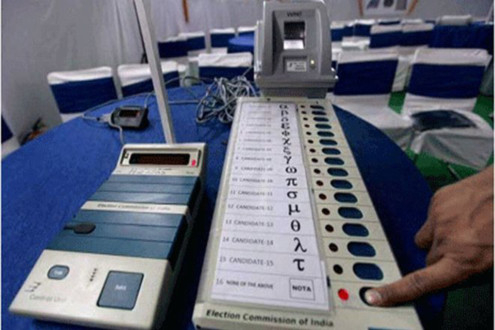
Doubts over the reliability of the Electronic Voting Machines (EVM) used by the Election Commission of India (ECI) have surfaced all over again, with people and political parties questioning the ability of the machines to correctly collect the collective voice of the people through franchise.
This is not the first time, though, that the dependability of the machines has been questioned. Since their introduction in 1982, the trustworthiness of the machines has been questioned several times, amidst claims that they record the wish of the party in power rather than the will of the people.
The latest row comes in the wake of a mock poll in Madhya Pradesh, when the voter verifiable paper audit trail (VVPAT) showed that irrespective of the party voted for, the vote was being registered to the ruling Bharatiya Janata Party (BJP). The party, however, has rubbished the charges, claiming that it has no control over the ECI — a constitutionally independent body — or its functioning. However, the event though comes at a time which can cast a very serious doubt on the vibrant democracy we all proudly boast off. It comes at a time, when hyper-nationalism is being muzzled with a totalitarian and majoritarianism rule unprecedented in the history of independent India.
Being fortunate enough to have to witnessed several general and state elections in India from close quarters as a journalist, the very idea of a democratic India is no short of a miracle. Surrounded by several dictatorial states and unstable democracies, Indian is an oasis when it comes to democratic values and practices.
Every time an election is held, the participation of the people from every strata of the society has amazed me. A festive mood is witnessed across the country on voting day as people rise above castes, regionalism, linguistic chauvinism and religious divides to preserve the very idea of India. On that day, the common man is the celebrity, on that day he or she is the king-maker. On that day, by pressing a single button, he gives assurance of his or her commitment towards democracy to rest of the country and the world.
It is the sole responsibility of the election commission to preserve this trust and festivity over democracy. If this disposition of distrust over the functioning of EVMs spreads, it fuels a widespread feeling of mistrust on the authenticity of the voting process that can paralyse Indian democracy in a short time. The election commission and its full bench of commissioners have to give convincing answers in a more vocal way.
High security measures
The ECI all throughout has maintained that the system is safe and fully tamper-proof, though a combination of safeguards — of the software type as well as technical, administrative, independent technical watchdog oversight and judicial scrutiny. The poll watchdog has tried to soothe nerves by claiming that the machines are exclusively made by two central public sector undertakings, which are entrusted with developing high-security defence equipment for India. The software used is burnt into a one-time programmable chip, so that it cannot be altered or tampered with. The machines are not connected to the internet or any other machine or system. Therefore, there is no possibility of data corruption by hacking.
The ECI also claims that the software for this chip is developed in-house independently. Samples of EVMs from production batches are regularly checked by the quality assurance group, which is an independent group. The average Indian — who struggles to operate his smartphone that is worth far more than an EVM machine, and is always in fear of being hacked — finds it difficult to believe that a human-made machine is tamper-proof when equipment worth billions of dollars crashes everyday all over the world.
Several countries, including developed economies with far reaching technological prowess, have scrapped or decided against using EVMs — choosing to go back to pen and paper after due consideration. These include Germany, the Netherlands, the United Kingdom, France and Italy.
Several universities abroad have also questioned the veracity of the Indian EVMs. However, the ECI continues to back it as it believes it has helped to make elections in India transparent. The biggest argument in favour of EVMs is that it has reduced booth capturing, has made people more aware and most importantly made the process of vote counting much less time consuming. It also saves paper, thus saving the world’s vegetation.
In recent times, those who have questioned the electoral process are being branded as anti-national on social media. I await their verdict on this opinion piece.
This, however, is no way is to undermine the ECI but a polite reminder that the human belief system, as we all know, is fragile in any relationship. It takes years to build but can be broken in a fraction of a second. It is for the EC to remember this and continue strengthening Indian democracy.
Archisman Dinda is a freelance journalist based in Kolkata, India.










